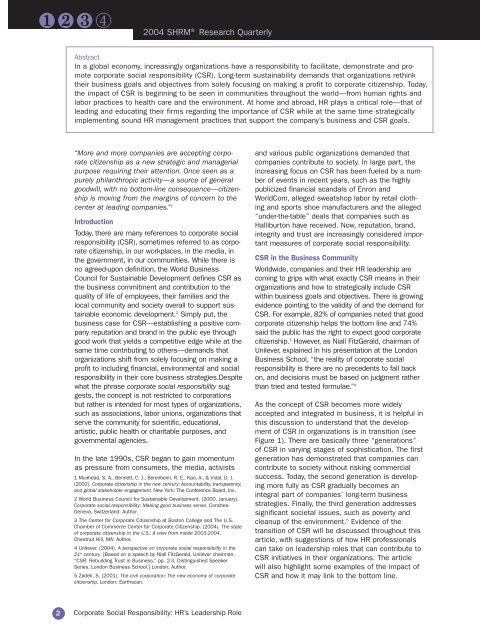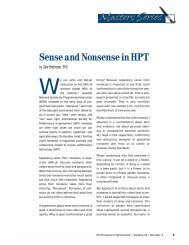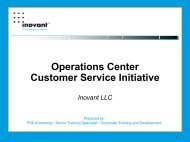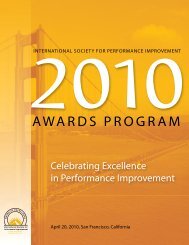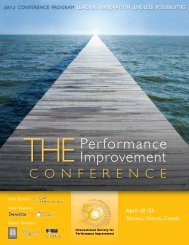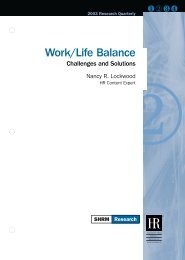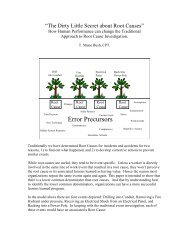Corporate Social Responsibility: HR's Leadership Role
Corporate Social Responsibility: HR's Leadership Role
Corporate Social Responsibility: HR's Leadership Role
Create successful ePaper yourself
Turn your PDF publications into a flip-book with our unique Google optimized e-Paper software.
2004 SHRM® Research Quarterly<br />
Abstract<br />
In a global economy, increasingly organizations have a responsibility to facilitate, demonstrate and promote<br />
corporate social responsibility (CSR). Long-term sustainability demands that organizations rethink<br />
their business goals and objectives from solely focusing on making a profit to corporate citizenship. Today,<br />
the impact of CSR is beginning to be seen in communities throughout the world—from human rights and<br />
labor practices to health care and the environment. At home and abroad, HR plays a critical role—that of<br />
leading and educating their firms regarding the importance of CSR while at the same time strategically<br />
implementing sound HR management practices that support the company’s business and CSR goals.<br />
“More and more companies are accepting corporate<br />
citizenship as a new strategic and managerial<br />
purpose requiring their attention. Once seen as a<br />
purely philanthropic activity—a source of general<br />
goodwill, with no bottom-line consequence—citizenship<br />
is moving from the margins of concern to the<br />
center at leading companies.” 1<br />
Introduction<br />
Today, there are many references to corporate social<br />
responsibility (CSR), sometimes referred to as corporate<br />
citizenship, in our workplaces, in the media, in<br />
the government, in our communities. While there is<br />
no agreed-upon definition, the World Business<br />
Council for Sustainable Development defines CSR as<br />
the business commitment and contribution to the<br />
quality of life of employees, their families and the<br />
local community and society overall to support sustainable<br />
economic development. 2 Simply put, the<br />
business case for CSR—establishing a positive company<br />
reputation and brand in the public eye through<br />
good work that yields a competitive edge while at the<br />
same time contributing to others—demands that<br />
organizations shift from solely focusing on making a<br />
profit to including financial, environmental and social<br />
responsibility in their core business strategies.Despite<br />
what the phrase corporate social responsibility suggests,<br />
the concept is not restricted to corporations<br />
but rather is intended for most types of organizations,<br />
such as associations, labor unions, organizations that<br />
serve the community for scientific, educational,<br />
artistic, public health or charitable purposes, and<br />
governmental agencies.<br />
In the late 1990s, CSR began to gain momentum<br />
as pressure from consumers, the media, activists<br />
1 Muirhead, S. A., Bennett, C. J., Berenbeim, R. E., Kao, A., & Vidal, D. J.<br />
(2002). <strong>Corporate</strong> citizenship in the new century: Accountability, transparency,<br />
and global stakeholder engagement. New York: The Conference Board, Inc.<br />
2 World Business Council for Sustainable Development. (2000, January).<br />
<strong>Corporate</strong> social responsibility: Making good business sense. Conches-<br />
Geneva, Switzerland: Author.<br />
3 The Center for <strong>Corporate</strong> Citizenship at Boston College and The U.S.<br />
Chamber of Commerce Center for <strong>Corporate</strong> Citizenship. (2004). The state<br />
of corporate citizenship in the U.S.: A view from inside 2003-2004.<br />
Chestnut Hill, MA: Author.<br />
4 Unilever. (2004). A perspective on corporate social responsibility in the<br />
21 st century. [Based on a speech by Niall FitzGerald, Unilever chairman,<br />
“CSR: Rebuilding Trust in Business,” pp. 2-3. Distinguished Speaker<br />
Series, London Business School.] London: Author.<br />
5 Zadek, S. (2001). The civil corporation: The new economy of corporate<br />
citizenship. London: Earthscan.<br />
and various public organizations demanded that<br />
companies contribute to society. In large part, the<br />
increasing focus on CSR has been fueled by a number<br />
of events in recent years, such as the highly<br />
publicized financial scandals of Enron and<br />
WorldCom, alleged sweatshop labor by retail clothing<br />
and sports shoe manufacturers and the alleged<br />
“under-the-table” deals that companies such as<br />
Halliburton have received. Now, reputation, brand,<br />
integrity and trust are increasingly considered important<br />
measures of corporate social responsibility.<br />
CSR in the Business Community<br />
Worldwide, companies and their HR leadership are<br />
coming to grips with what exactly CSR means in their<br />
organizations and how to strategically include CSR<br />
within business goals and objectives. There is growing<br />
evidence pointing to the validity of and the demand for<br />
CSR. For example, 82% of companies noted that good<br />
corporate citizenship helps the bottom line and 74%<br />
said the public has the right to expect good corporate<br />
citizenship. 3 However, as Niall FitzGerald, chairman of<br />
Unilever, explained in his presentation at the London<br />
Business School, “the reality of corporate social<br />
responsibility is there are no precedents to fall back<br />
on, and decisions must be based on judgment rather<br />
than tried and tested formulae.” 4<br />
As the concept of CSR becomes more widely<br />
accepted and integrated in business, it is helpful in<br />
this discussion to understand that the development<br />
of CSR in organizations is in transition (see<br />
Figure 1). There are basically three “generations”<br />
of CSR in varying stages of sophistication. The first<br />
generation has demonstrated that companies can<br />
contribute to society without risking commercial<br />
success. Today, the second generation is developing<br />
more fully as CSR gradually becomes an<br />
integral part of companies’ long-term business<br />
strategies. Finally, the third generation addresses<br />
significant societal issues, such as poverty and<br />
cleanup of the environment. 5 Evidence of the<br />
transition of CSR will be discussed throughout this<br />
article, with suggestions of how HR professionals<br />
can take on leadership roles that can contribute to<br />
CSR initiatives in their organizations. The article<br />
will also highlight some examples of the impact of<br />
CSR and how it may link to the bottom line.<br />
2<br />
<strong>Corporate</strong> <strong>Social</strong> <strong>Responsibility</strong>: HR’s <strong>Leadership</strong> <strong>Role</strong>


